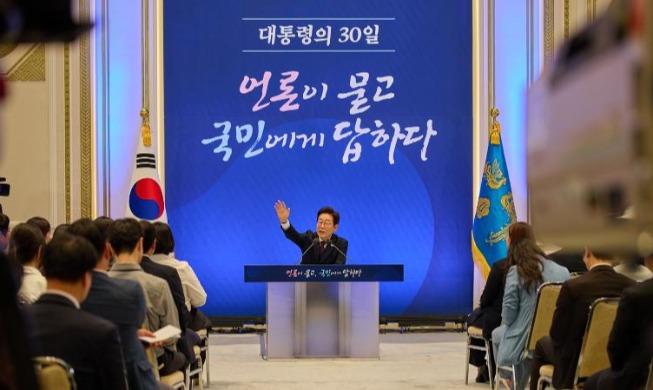
Foreign exchange dealers on Feb. 7 work at the headquarters of KEB Hana Bank in Seoul's Jung-gu District. The won-dollar exchange rate that day closed at 1,124.10, up 5.30 points from the previous day. (Yonhap News)
By Xu Aiying and Yoon Sojung
The Korean won, once one of the world's most volatile currencies, has recently grown more stable and less volatile.
Trade tension between the U.S. and China and instability in emerging countries dating back to last year have escalated volatility in the international financial market, but the Korean economy remains stable thanks to abundant foreign currency reserves and continuing current-account surplus.
Korea's foreign exchange reserves hit a record-high USD 405.5 billion in January, while the current-account surplus reached USD 75 billion last year.
The credit default swap, which measures the country's default risk, saw an average of 32 basis points as of Jan. 31, the lowest level since the financial crisis of 2007-08.
The stronger stability of the won has been attributed to lower geopolitical risk on the Korean Peninsula thanks to last year's three inter-Korean summits and the first North Korea-U.S. summit.
According to Seoul Money Brokerage Services on Feb. 10, the won-dollar exchange rate moved in the range of 1,100 to 1,140 over the last six months ending on Feb. 8 and from 1,050 to 1,150 over the last two years. These figures show the lower volatility and higher stability trends of the Korean currency.
The Korean daily Hankyoreh reported on the won's growing stability on Feb. 10, saying, "Once North Korea was mentioned, the won-dollar exchange rate largely fluctuated in the past due to external foreign exchange speculators, which consequently led to similar movements by other Asian currencies. Nowadays, however, the opposite has occurred."
"Analysts say the won is starting to be recognized among more advanced currencies and not as a volatile currency vulnerable to shifts in North Korea," it said, adding, "The Korean won has been transforming itself in breaking its previous image as an unstable currency."
xuaiy@korea.kr
Most popular
- Grammy-winning producer calls Suga of BTS 'amazing artist'
- Animated 'KPop Demon Hunters' tops Netflix charts in 41 markets
- 'Squid Game' events to pump up K-Content Seoul Travel Week
- Reunited BLACKPINK releases video preview of world tour
- 'Universal love, family' themes fuel success of 'King of Kings': director
